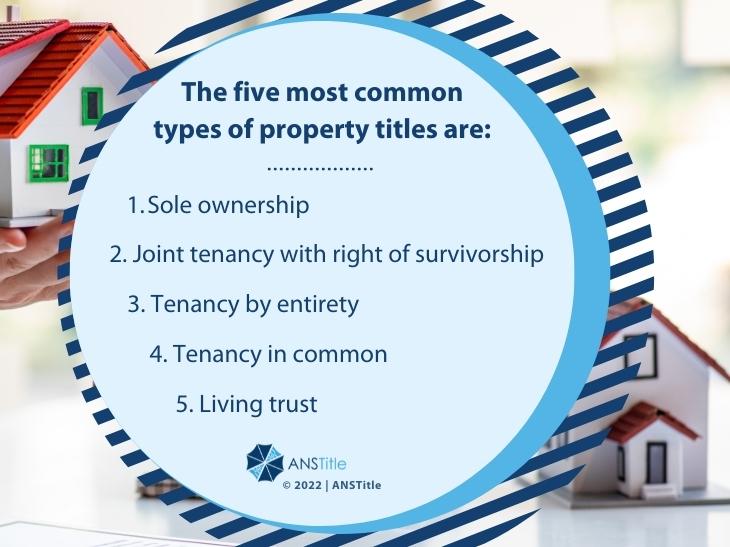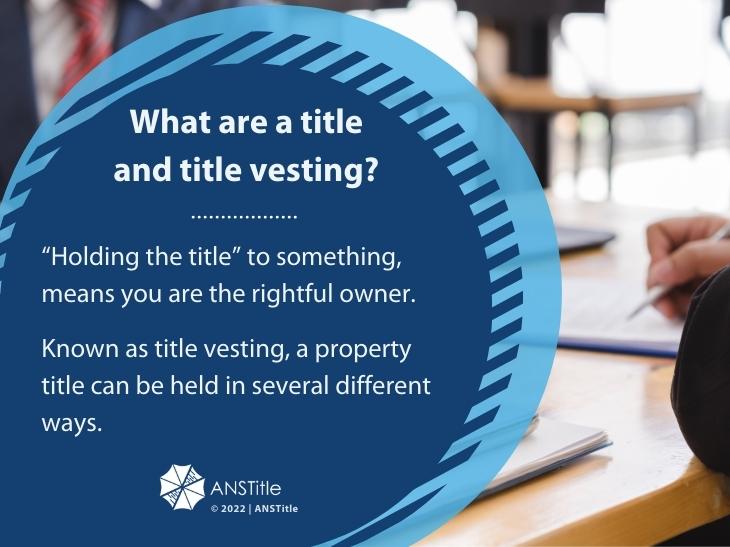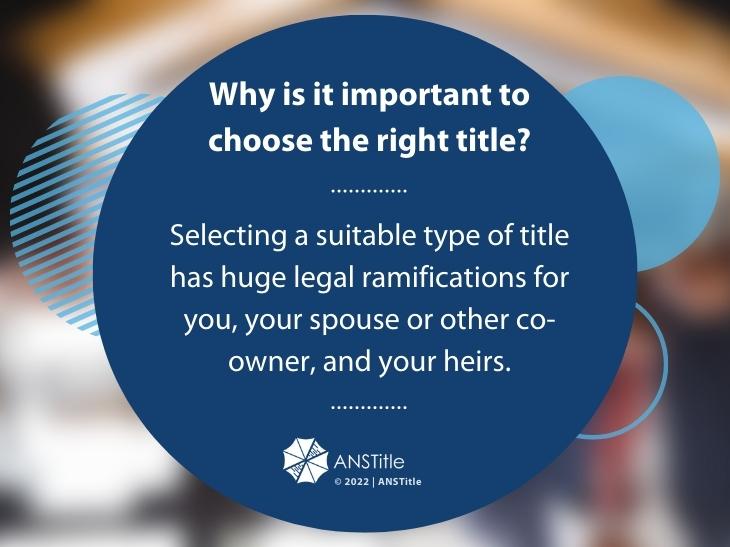When you embark on your home buying journey, you will have to make important decisions nearly every step of the way. While some of these decisions, such as choosing a good title and escrow agent, can simply make the closing process smoother, others can have much bigger and long-term consequences for your home ownership. Case in point, selecting the best-suited title for your particular scenario will have an impact on what happens to your ownership rights and the home way past the closing date and even after your death.
In this article, the agents from ANSTitle, a New York title insurance company with over 50 years of transactional real estate experience, will review the five most common types of title and share a few example scenarios of when to use each. But first, let’s review the concepts of title and title vesting.

What are a title and title vesting?
A title is an abstract concept that refers to the rights of one or more individuals to hold, use, and sell a real estate property. When you “hold the title†to something, you are the rightful owner.
 When a home is being sold, the title gets transferred from the original owner to a new owner via a legal document known as a deed. The deed is then recorded with the local county and the county records are updated to reflect the new ownership.
Before the deed can get executed, however, the new owner or owners need to decide which type of title to use for their ownership. Also known as title vesting, a property title can be held in several different ways.
Why is it important to choose the right title?
While it may not seem immediately apparent at the time of your closing, selecting a suitable type of title has huge legal ramifications for you, your spouse or other co-owner, and your heirs. It can impact:
- your rights to sell your share of a property – for example, the joint tenancy and tenancy in common titles allow each owner to sell their share even if the other party objects, whereas the tenancy by entirety title requires consent from the other spouse;
-  who inherits the home after your death – with a joint tenancy title your spouse will automatically inherit your share after your death; in contrast, a tenancy in common title allows each owner to pick their own beneficiaries;
- the distribution of home sale funds after your death – if you’d like to allocate specific shares to each beneficiary, you can set up a living trust;
-  whether debt collectors can come after your share of the property – as we mentioned earlier, because each spouse owns 100% of the home with a tenancy by entirety title, creditors can’t take one spouse’s share;
- whether your heirs have to go to probate court – the joint tenancy title allows a surviving spouse to inherit the deceased spouse’s share without going through probate court. A living trust, which includes detailed instructions on who inherits what, also avoids the need for probate court.
How to choose the right title option?
Choosing the best title option for your particular situation may sound daunting at first. With some planning, however, you will be able to select the title best suited for your intentions.
 In order to make an educated decision on how to vest your title, take into consideration the following aspects:
- your marital status – different titles are better suited for single individuals, married couples, second marriages, etc;
- the intent of the home purchase – whether you’re purchasing the house for a primary residence or investment makes a difference;
- owners relationship – are the owners spouses, investment partners, etc;
- your will plans – who do you want to leave the property to after your death.
What types of titles are there?
Below are the five most common types of property titles. The main differences between the various title vesting options revolve around your rights as an owner and the inheritance of those ownership rights after your death.
Sole Ownership
With a sole ownership title, all rights to the property belong to a single individual. If the sole owner dies, the home will go through probate court and then to a designated heir in a will or if there is no will, to specific relatives as determined by the state law.
Commonly used by: single individuals, but also married individuals, who purchase real estate assets as an investment.
Joint Tenancy With Right of Survivorship
This type of title is held by two or more individuals, who purchase a home together and own equal shares of it. Each owner has the right to sell their portion of the property. Upon the death of an owner, however, their ownership rights are transferred to the remaining owner without having to go through probate court.
Commonly used by: Couples purchasing a home together with the intent to leave the entire home to the surviving spouse.
 Tenancy by Entirety
Tenancy by Entirety
The tenants by entirety title is only available to married couples and it grants full ownership of the property to each spouse. Because each spouse owns 100% of the property, it does not need to go to probate court when one of the owners dies. Some states don’t allow this type of title and use community property with right of survivorship instead.
Commonly used by: Married couples where one partner has debt and wants to protect the home from creditors.
Tenancy in Common
The tenancy in common title allows two or more individuals to own a property together, however, each owner can independently sell their share or will it to a beneficiary of their choice. If there is no will at the time of an owner’s death, their property share will be sent to probate court.
Commonly used by: Couples in second marriages, who would like to leave their individual title shares to their children or grandchildren rather than their current spouse; any other group of owners, who don’t want their share to automatically transfer to the other owner upon their death.
Living Trust
A living trust allows you to leave your property to the beneficiaries of your choice without having to go through probate court. It provides specific instructions on how to handle the property rights after your death.
Commonly used by: Property owners who want to leave very specific details about the handling of their property after they die.
Now that you understand the different title vesting options, you should be able to make an educated decision about the best way to title your home. If you do have further questions about what impact titles have on your ownership rights and will options, please reach out to our office. If you’re looking to buy a home, we can also help with title searches and title insurance quotes in NY and NJ.






